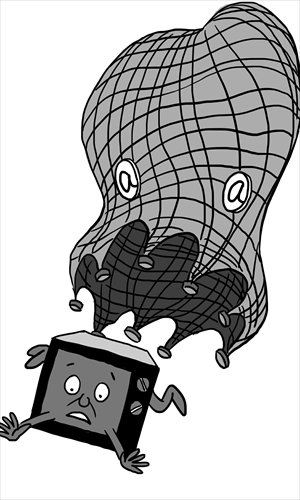Broadcast advantages still strong in Internet age

We're in the middle of an information explosion, and the Internet is booming. TV seems to be being deserted for newer, sexier options. But is the fall of TV either likely or desirable?
US business magazine Forbes released a survey earlier this year, showing that the number of consumers in 10 countries, including China, who watch broadcast or cable TV in a typical week dropped some 20 percent between 2009-2011. But the survey also said that those who had dropped TV were still watching the shows, but not on TV sets. Instead they turned to other devices like smartphones, laptops, and tablets. That may involve copyright issues. But thanks to somewhat stricter monitoring, some dramas can now only be found online after being first played on TV.
Actually, as most of the country's population remains in rural areas and middle and small cities, portable devices are not as commonly used as they assumed to be. Traditional media like TV and newspaper are still the main elements in people's lives.
It's argued that those TV viewers are mostly middle-aged and senior citizens in rural areas, which is not true. The largest part of the audiences of some very popular TV shows like dating and talent shows are young people who are in their 20s and 30s.
With a huge output and abundant variety, TV dramas are viewed by people of all ages. Because of the popularity of these shows, more and more reports are concerning social phenomena related to them. Some complain about the poor quality of those shows, but why not complain about the viewers' tastes? TV stations make those shows because they are well received and popular.
Some have suggested that the elite don't watch TV. Well, that really depends on how the elite is defined. Politicians and company managers may be considered the elite. They do watch TV, because politicians need to appear on TV while businessmen need the right information to help craft business strategies. I know some professionals like doctors, lawyers and journalists, and they watch TV too. They say after a day's exhausting work, they'd like to sit comfortably in the couch and watch TV as a relaxation.
Although most of information may be found online, TV is still the first choice for real-time programs like live broadcast of sport matches, press conferences and official speeches. What's more, in a virtual world where millions of pieces of news are posted, it's often impossible to tell their authenticity. TV is a much more reliable and fast spreading medium.
Al Jazeera has become the platform to get the latest news of the Middle East, while the BBC and CNN are still the most authoritative broadcasting stations. Most Chinese may not have access to these sources, yet CCTV is still the official channel where some key information is released. Even though what we see on TV may not be the entire story, modern people are clever enough to complete the picture through other means.
Fast growing technology provides us more choices and convenience. What we need to do is to utilize them effectively and efficiently. TV is playing a less important role now, and the shows do need to be improved. But it's far too early to say it's time for TV to die out. On the contrary, it's necessary as a complement to other media. Anyway, the much older newspaper is still vigorously alive despite long predictions of its death. And what are you reading this article in?
The author is a CCTV journalist. opinion@globaltimes.com.cn
Counterpoint: TV drains us of ability to make our own decisions